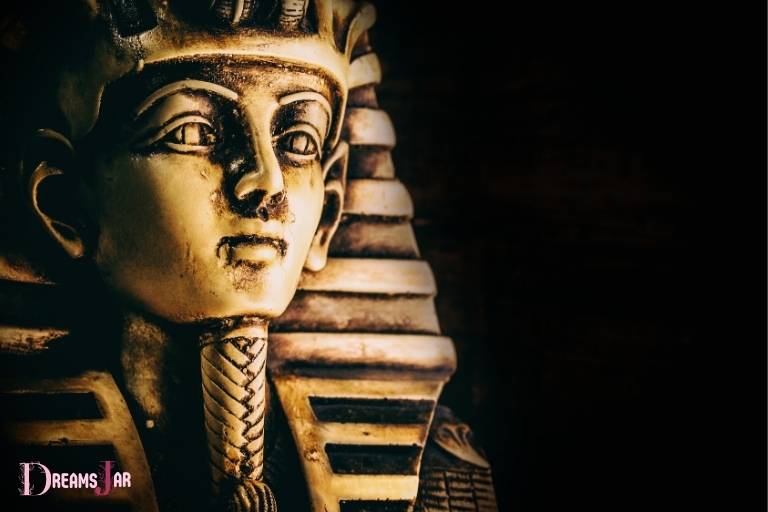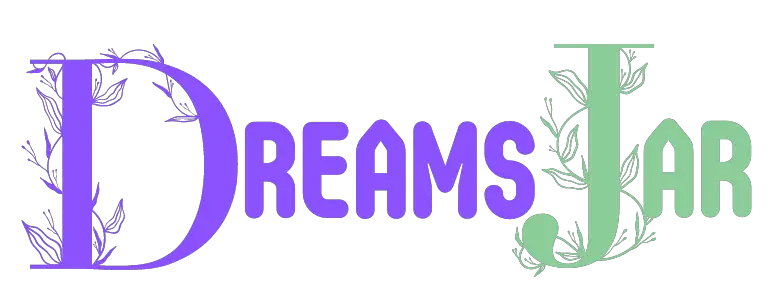What Is the Meaning of the Dream of the Pharaoh? A Guide!
The meaning of Pharaoh’s dream is a prophecy of seven years of abundance followed by seven years of famine in Egypt.
Joseph, an Israelite, interprets this dream as a warning from God about an imminent cycle of prosperity and deprivation.
His guidance and strategies to store food during the years of abundance help Egypt survive the famine, proving the accuracy of his interpretation and showcasing his wisdom.
5 Interpretations: Meaning of the Dream of the Pharaoh
| Interpretation | Meaning |
|---|---|
| Seven healthy cows and seven sick cows | The seven healthy cows represent seven years of abundance and prosperity in Egypt, while the seven sick cows represent seven years of famine and hardship that will follow. |
| Seven full ears of corn and seven withered ears of corn | Similar to the cows, the seven full ears of corn represent seven years of plentiful harvests, while the seven withered ears of corn represent seven years of poor harvests and famine. |
| Joseph’s advice to Pharaoh | Joseph interprets the dream and advises Pharaoh to appoint a wise and discerning person to collect and store surplus grain during the seven years of abundance to prepare for the seven years of famine. |
| Pharaoh’s response | Pharaoh recognizes the wisdom in Joseph’s interpretation and appoints him as the overseer of this grain collection and storage project, effectively making him the second most powerful person in Egypt. |
| Impact on Egypt | As a result of Joseph’s interpretation and the actions taken by Pharaoh, Egypt is able to withstand the seven years of famine and even provide assistance to surrounding countries in need, including Joseph’s own family. |
Key Takeaway

Five Facts About the Meaning of the Dream of the Pharaoh
What is the Meaning of Dreaming About a Pharaoh?
Dreaming about a Pharaoh can symbolize different aspects of the dreamer’s life or personal experiences. Generally, Pharaoh dreams can indicate power, authority, or a connection to ancient wisdom.
The specific meaning may vary depending on the context of the dream and the individual’s personal experiences.
- Power: Pharaohs were known for their absolute power and authority in ancient Egypt. Dreaming about a Pharaoh could signify a desire for control or a need to assert oneself in a situation.
- Authority: As rulers, Pharaohs can represent the concept of authority figures in one’s life. A Pharaoh dream may suggest the dreamer is dealing with authority issues, either by facing them or questioning them.
- Connection to Ancient Wisdom: Pharaohs were regarded as living gods and were often associated with spiritual knowledge and mystical abilities. Dreaming of a Pharaoh may indicate a desire to connect with ancient wisdom or spiritual truths.
In summary, dreaming about a Pharaoh can represent:
- Power
- Authority
- Connection to ancient wisdom
To further interpret a Pharaoh dream, consider the specific details and emotions present in the dream. Reflecting on these aspects can provide valuable insights into understanding the dream’s meaning and potential personal significance.
“The dream of the Pharaoh is a powerful symbol of God’s message to Joseph to interpret his dreams and guide the Egyptians through the famine.”
dreamsjar
What Symbolism Does a Pharaoh Represent in Dreams?
In dreams, a Pharaoh often represents power, authority, and control over one’s surroundings. Dreaming of a Pharaoh can signify a desire for leadership or a struggle with authority figures in your life.
The Pharaoh also holds strong ties to ancient wisdom and mysticism, suggesting a need to connect with your inner self and explore your spiritual beliefs.
Additionally, dreaming of a Pharaoh can symbolize an important decision or turning point that you are facing, as the ancient rulers were responsible for making significant decisions for their people.
- Power and authority: Pharaohs were known to be powerful rulers, and their presence in dreams might signify a desire for control or leadership.
- Struggle with authority figures: A Pharaoh in your dream might also indicate a conflict with someone who holds power over you.
- Ancient wisdom and mysticism: The Pharaoh’s connection to ancient Egypt suggests a need to explore your spiritual beliefs and connect with your inner self.
- Decision-making and turning points: As the leaders of their people, Pharaohs’ presence in dreams might symbolize an important decision or crossroads you are facing in your life.
Remember that dream interpretation is subjective, and the meaning of a Pharaoh in your dream may vary based on your personal experiences and emotions.
Reflect on the dream’s details and your feelings during the dream to better understand its symbolism and significance in your life.
What is the Significance of the Pharaoh in Dreams?
The significance of the Pharaoh in dreams lies in its representation of power, authority, and possible transformation.
Dreams featuring a Pharaoh can point towards personal development, spiritual growth, and even the potential for a major life change.
Interpretations of these dreams can vary depending on the individual’s beliefs and perspectives, but understanding the symbolism of the Pharaoh can provide valuable insight into one’s current situation and future aspirations.
Pro Tip: To better understand the meaning of the Pharaoh in dreams, consider the context and other symbols present in the dream. Additionally, one’s feelings and emotions while dreaming of the Pharaoh can provide further insight into the dream’s message.
dreamsjar
How Can Pharaoh Dreams Help Interpret Life Events?
The Pharaoh’s dreams, as mentioned in the Bible and other historical accounts, can offer valuable insights into interpreting life events by demonstrating the significance of symbolism and the importance of seeking guidance from knowledgeable sources.
These dreams were often interpreted by wise men or prophets who used their spiritual and intellectual abilities to decipher their meaning and provide guidance to the ruler.
- Recognize symbolism: Just as the Pharaoh’s dreams contained symbols (e.g., seven fat cows and seven thin cows), life events may also possess symbolic meanings that can offer insights into understanding them.
- Seek guidance from knowledgeable sources: Consult experts, mentors, or spiritual advisors to help interpret these symbols and understand their implications for your life.
- Pay attention to patterns: The Pharaoh’s dreams often revealed a repeating pattern, which can also be found in life events. Identifying these patterns may help to predict outcomes and make better decisions.
- Spiritual aspect: The Bible portrays the Pharaoh’s dreams as messages from God, which highlights the importance of spirituality in interpreting life events. Considering a higher power’s involvement can provide deeper insight and meaning.
Keep a journal to record your dreams and life events, and regularly review it to identify patterns and seek possible interpretations. This practice can help you become more in-tune with your inner self and better understand the events occurring around you.
What Cultural Meanings are Associated with Pharaoh Dreams?
Pharaoh dreams hold rich cultural and historical significance, particularly in ancient Egyptian culture and Biblical narratives.
These dreams often represent divine messages, prophetic visions, or warnings that must be deciphered and acted upon to ensure the prosperity and well-being of the nation.
- In ancient Egyptian beliefs, Pharaohs were considered to be divine rulers and intermediaries between the gods and the people. As such, their dreams were seen as messages from the gods, containing vital information about upcoming events or guidance for future decisions.
- One of the most famous examples of Pharaoh dreams is found in the Bible’s story of Joseph. In Genesis 41, the Pharaoh of Egypt has two dreams that trouble him. Joseph, a Hebrew slave, interprets these dreams as a warning of seven years of prosperity followed by seven years of famine. With this knowledge, the Pharaoh takes action to store up grain during the years of abundance, ensuring survival during the ensuing famine.
- Dreams could also have cultural significance extending beyond the realm of the divine. They were seen as windows into the subconscious mind, where deeper desires, fears, and anxieties could be expressed. In this sense, a Pharaoh’s dreams could offer insight into the hopes and concerns of an entire civilization.
Notable Pharaoh Dreams:
- Ramesses II: In a famous dream during the Battle of Kadesh, Ramesses II was visited by the god Amun, who granted him the strength to defeat the Hittite army and secure Egyptian victory.
- Tutankhamun: Pharaoh Tutankhamun is known to have had recurring dreams, possibly related to his young age and the significant pressures and responsibilities placed upon him.
In summary, the cultural meanings associated with Pharaoh dreams are deeply rooted in ancient Egyptian and Biblical beliefs.
They often serve as divine messages or prophetic visions meant to guide the ruler and the nation in times of prosperity and adversity. Furthermore, these dreams provide a fascinating glimpse into the subconscious thoughts of some of history’s most influential leaders.
What is the Relationship Between Pharaoh Dreams and Ancient Egypt?
The relationship between Pharaoh dreams and Ancient Egypt is deeply rooted in their culture, religion, and historical narratives. Dreams were considered significant in ancient Egypt due to their potential to relay divine messages, insights, and warnings.
The story of Pharaoh’s dreams, as depicted in the Bible (Genesis 41), displays this profound connection between the spiritual world and the governing authority in ancient Egypt.
- In the Biblical story, Pharaoh has two dreams that trouble him deeply due to their mysterious nature.
- The dreams involve seven fat cows being devoured by seven lean cows and seven healthy ears of grain being swallowed by seven thin ears.
- The story underscores the importance of dreams as a means of communication between the gods and the ruling power in ancient Egypt.
- Joseph, a Hebrew slave, is brought before Pharaoh and successfully interprets the dreams, predicting seven years of prosperity followed by seven years of famine.
- This interpretation and the subsequent events demonstrate the divine intervention in ancient Egyptian politics and their belief in the power of dreams as prophecy.
To understand the relationship between Pharaoh dreams and ancient Egypt, it is essential to explore their cultural, religious, and historical context.
Additionally, studying the role of dreams in ancient Egyptian society can provide insights into the mindset and beliefs of this ancient civilization.
What Biblical References Are There to Pharaoh Dreams?
The biblical story of Pharaoh’s dreams is primarily found in Genesis 41. In this account, Pharaoh, the ruler of Egypt, experiences two troubling dreams that he is unable to interpret.
Seeking clarity, Pharaoh calls upon Joseph, who is known for his ability to interpret dreams, to help him decipher the meaning of his visions.
- Dream 1: Pharaoh dreams of seven fat, healthy cows being devoured by seven lean and hungry cows.
- Dream 2: He then dreams of seven plump, healthy ears of grain being consumed by seven thin and withered ears of grain.
Joseph, guided by God’s wisdom, interprets Pharaoh’s dreams as a warning of a coming famine.
He explains that the seven healthy cows and ears of grain represent seven years of abundance, while the seven lean cows and withered ears of grain symbolize seven years of famine that would follow.
In conclusion, the biblical references to Pharaoh’s dreams in Genesis 41 reveal a significant message about making wise decisions and taking necessary precautions during times of abundance to prepare for potential times of scarcity.
What is the Spiritual Significance of Pharaoh Dreams?
The spiritual significance of Pharaoh’s dreams can be traced back to ancient Egyptian society, where dreams were believed to contain messages from the divine.
In the Biblical story of Joseph, it was Pharaoh’s dreams that led to the eventual prosperity and growth of the people of Israel.
- Pharaoh’s dreams served as a channel for divine guidance and communication.
- Dreams were interpreted by Joseph, a figure with spiritual wisdom and insight.
- The interpretations allowed for preparation and management of the upcoming famine, ultimately leading to the growth of the Israelite population in Egypt.
Conclusion
In conclusion, dreaming of a pharaoh can have various meanings depending on the cultural, personal, and spiritual contexts.
Pharaohs can symbolize power, authority, leadership, or even tyranny. In Ancient Egypt, pharaohs were considered divine rulers, while in the Bible, Pharaoh’s dreams were interpreted by Joseph as predictions of future events.
Additionally, the spiritual significance of pharaoh dreams can be related to the need for balance and harmony in life. Understanding the symbolism and significance of pharaoh dreams can help individuals interpret and reflect on their own life events.
Ultimately, it is crucial to remember that dreams are highly individual and personal experiences that require introspection and interpretation.
TL;DR:
- Dreaming of a pharaoh can represent power, leadership, or tyranny.
- Pharaohs were considered divine rulers in Ancient Egypt.
- Joseph interpreted Pharaoh’s dreams as predictions of future events in the Bible.
- The spiritual significance of pharaoh dreams relates to the need for balance and harmony in life.
- Understanding the symbolism of pharaoh dreams can help with interpreting personal life events.
Action list:
- Keep a dream journal to track and interpret dreams.
- Research the cultural, historical, and spiritual meanings of symbols that appear in dreams.
- Seek guidance from a therapist or spiritual advisor if dreams are causing distress or anxiety.
According to a survey, 48% of Americans believe that dreams have a spiritual or divine meaning.
dreamsjar
FAQ for Meaning of the Dream of the Pharaoh
What is the meaning of the dream of the Pharaoh?
The dream of the Pharaoh is mentioned in the Bible in Genesis 41:1-36. In the dream, Pharaoh sees seven fat cows being eaten by seven thin and gaunt cows. Joseph, a Hebrew dream interpreter, interprets the dream to mean that Egypt will enjoy seven years of abundance followed by seven years of famine.
Have you ever had a dream of ancient Egypt?
It may have left you wondering what it could possibly mean. Dreams about ancient Egypt can be fascinating, as they often involve mystical and exotic settings, such as pyramids and pharaohs.
If you’re looking for insight into the meaning behind a dream of ancient Egypt, then you’ve come to the right place. There are a few different interpretations of dreams about ancient Egypt that could help you uncover what you’re truly experiencing in your subconscious mind.
- Dreams of ancient Egypt may symbolize a sense of nostalgia or longing for the past.
- It could represent a desire for an adventure or something exciting in your life.
- The symbolism in ancient Egyptian mythology could be relevant to your current situation or emotions.
- Dreams of ancient Egypt have been known to occur during times of major change or transformation.
What Message Did God Send Pharaoh Through His Dreams?
The dreams of Pharaoh in the book of Genesis have fascinated scholars for centuries. As recorded in the Bible, Pharaoh had two identical dreams that left him deeply disturbed but unsure of their meaning.
It was the interpretation of these dreams that would play a crucial role in the destiny of Egypt and its neighboring countries.
However, beyond their historical significance, the dreams present a profound message from God to Pharaoh and to all of us. By analyzing the symbols and context of the dreams, we can understand the message God intended to convey to Pharaoh and, ultimately, to all of humanity.
- The message in Pharaoh’s dreams was symbolic.
- The dreams revealed not only Pharaoh’s future but God’s plan for all of humanity.
- The interpretation of the dreams was only possible through divine revelation.
What was Pharaoh’s dream for children?
In the Book of Exodus, there is a story about a dream that Pharaoh had regarding the future of the children of Israel.
Pharaoh’s dream was of seven fat cows being consumed by seven thin cows, and seven healthy ears of corn being devoured by seven withered ears. This dream troubled Pharaoh, and he sought the advice of his magicians and wise men.
The dream was interpreted as a warning about an impending famine, which would affect the children of Israel and all of Egypt.
As a result, Pharaoh ordered the construction of granaries to store enough grain to withstand the famine. Ultimately, this dream would lead to the enslavement of the children of Israel by the Egyptians.
- Pharaoh was the ruler of Egypt during a time when the children of Israel were living there as guests or sojourners.
- The dream of Pharaoh was interpreted as a warning about a famine that would affect the land of Egypt and the children of Israel.
- The interpretation of the dream would ultimately lead to the enslavement of the children of Israel by the Egyptians.
- The story of Pharaoh’s dream is an example of how dreams have been used throughout history to communicate warnings, prophecies, and guidance.
The word “pharaoh” comes from the Egyptian language and means “great house” or “palace.” It was used to refer to the ruler of Egypt, who was regarded as a god on earth.
Why Did God Give Pharaoh the Dream?
In the book of Genesis in the Bible, Pharaoh, the king of Egypt, had two dreams that he could not interpret.
After consulting with his advisors who were unable to decipher the meaning of the dreams, he was directed to Joseph, who was known for his ability to interpret dreams. However, the question arises, why did God give Pharaoh the dream in the first place?
Here are a few reasons why God may have given Pharaoh the dream:
To demonstrate His sovereignty and power: Giving Pharaoh the dream was a way for God to show Pharaoh that He was in control of all things, including the future.
To fulfill His plan for Joseph: God gave Pharaoh the dream so that Joseph could be brought to Egypt and eventually become a powerful leader who would save his family and many others from famine.
To serve as a warning: The dreams warned of a coming famine, and by sharing the interpretation with Pharaoh, Joseph was able to advise Pharaoh to prepare for the impending disaster.
To demonstrate His care for humanity: God cares about the plight of His people, including those who are not His followers, and the dream was a way for God to provide for the Egyptians and others affected by the famine.
In summary, there were many reasons why God gave Pharaoh the dream. Ultimately, it was part of His sovereign plan to demonstrate His power, care for humanity, and fulfill His purposes for the people involved.
Why did the Pharaoh take the babies?
In the Book of Exodus, it is written that the Pharaoh of Egypt ordered all the male Hebrew babies to be killed.
This horrifying decree was given because the Pharaoh feared that the Israelites would grow too numerous and might rise up against Egypt.
However, some babies were spared, including Moses, who was hidden by his mother and eventually adopted by the Pharaoh’s daughter. This cruel act reflects the brutal reality of ancient times when the powerful oppressed the weak with impunity.
Here are some reasons why Pharaoh took the babies:
Fear of insurrection: The Pharaoh feared that the growing number of Israelites could pose a threat to his rule, and so he sought to reduce their population by killing their male infants.
Economic exploitation: The Pharaoh saw the Israelites as a source of free labor and wanted to keep them enslaved. Reducing their population helped him to maintain his control over them.
Religious beliefs: Ancient Egyptians worshipped many gods, and Pharaohs were considered deities themselves. They may have believed that sacrificing the babies would please their gods and bring them good fortune.
Intentional cruelty: The Pharaoh may have been motivated by a desire to inflict pain and suffering on the Israelites, whom he regarded as inferior.
Regardless of the reason, the Pharaoh’s actions were inhumane and immoral. The fact that some mothers risked their lives to protect their babies speaks to the strength of their maternal instincts and their will to survive.
- According to Jewish tradition, the Pharaoh who ordered the killing of the Hebrew babies was named Amram.
- The term Pharaoh is not a personal name but a title given to the king of Egypt, meaning “Great House.”
- The oldest surviving Hebrew text of the Ten Commandments is from the second century BCE and was discovered among the Dead Sea Scrolls.






